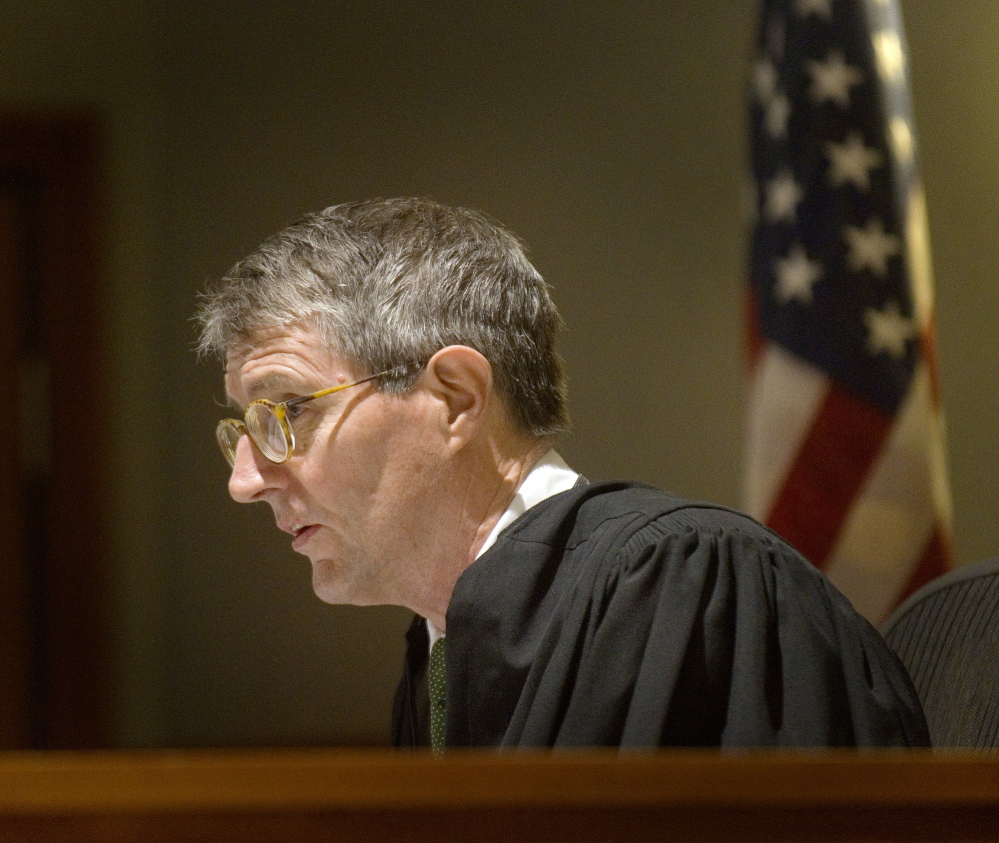For what could be the first time in Maine, a judge has stripped a criminal defendant of his constitutional right to have an attorney and has ordered the man to represent himself at his trial.
Joshua Nisbet, 36, of Scarborough, who is charged with holding up a convenience store in South Portland at knifepoint, faces as much as 30 years in prison if he is convicted of robbery. He has no legal training, and has said he doesn’t want to represent himself.
But the judge in the case, Justice Thomas Warren, said Nisbet’s behavior and the fact that he has gone through five court-appointed lawyers since his arrest in 2011 has left “no other alternative” than to order Nisbet to represent himself.
The judge issued the order last month after Nisbet’s most recent attorneys, Jon Gale and Neale Duffett, sought to withdraw from the case, claiming in a motion that Nisbet threatened Gale while they met with him in the Cumberland County Jail on Feb. 26.
According to the motion, Nisbet told them, “I don’t care if I get 15 years, when I get out, I will be outside your house with a high-powered BB gun and I will take your eye out. I’m not getting life. I’ll never forget. I’m coming after you when I get out.”
Nisbet says he never threatened Gale with violence, and that the attorneys invented the story as a way to get out of the case after he refused to plead guilty and threatened to sue them. Neither Gale nor Duffett has sought to have Nisbet charged with making a threat.
“It was a lie,” Nisbet said. “That was their way out. And when we went to court, I asked the judge, ‘Do not let them out. Do not take them off this case. They are trying to get out of this. You are letting them off easy.’ He did it anyway. Then I get this thing saying, ‘You have no attorneys.’ And here we are, I’m in a mess.”
Nisbet spoke in an interview at the Cumberland County Jail, his home for the past three years while he has awaited trial. Free of handcuffs and dressed in uniform orange, he was polite, shook hands with his visitors and told his story at a fast, impassioned clip.
He has turned to an unlikely champion: Mark Strong Sr.
Strong, a businessman and former private investigator from Thomaston, was convicted last year of promoting prostitution in the high-profile case of Alexis Wright, who operated a one-woman brothel at her Zumba studio and office in Kennebunk.
“The guy has gone out of his way, way above and beyond the call of duty for someone he does not know and something he has nothing invested in,” Nisbet said. “He’s just done this out of the kindness of his heart.”
Nisbet said he was referred to Strong by an inmate who served time with Strong during Strong’s 15 days in the York County Jail in the prostitution case.
‘RARE AND REGRETTABLE’ RULING
In finding that Nisbet has “forfeited his right to counsel,” Warren cited only federal cases from other states as precedents. He cited no case in Maine in which a criminal defendant was denied that constitutional right.
“Nisbet’s behavior, including his threats against counsel, cannot be rewarded with yet another continuance and yet another attorney, particularly when there is absolutely no basis to expect that a sixth attorney would be any more successful in getting along with the client,” Warren said in the five-page order. “The court understands this ruling is over Nisbet’s objection, and it takes this step with extreme reluctance.”
Mary Ann Lynch, spokeswoman for the state’s Judicial Branch, would not say whether Warren’s order is a legal first. “I cannot comment on a pending case,” Lynch said in an email.
But Jim Burke, a professor at the University of Maine School of Law, said he could not recall any case in Maine in which a defendant was denied a lawyer, something he called “wicked dangerous.”
“There is a reason to have lawyers. We know how the system works,” Burke said. “Nobody should go through it without assistance.”
Burke, who was first admitted to practice law in Maine in 1976, said he knows all five of Nisbet’s former attorneys and considers them highly competent, and he knows Warren as a judge who considers his decisions carefully.
“(Warren’s) not the sort to say willy-nilly, ‘You can’t have a lawyer,’ ” Burke said. “I guess the court just hit its limit. Whether that’s correct will be for the appellate court to decide when it gets up there.”
Carl Tobias, a professor at the University of Richmond School of Law in Virginia, said he has heard of only a few cases – none in Maine – in which a judge has deprived a defendant of a lawyer.
“At some point, the judge just exercises the discretion to say, ‘We need to move forward.’ It’s situations like this, where the defendant is difficult and won’t cooperate with counsel,” Tobias said.
Daniel Richman, who has been a professor at Columbia Law School in New York for 25 years, said it is “rare and regrettable” when a judge has to make such a ruling.
“This sounds like a case that has gone very far off the tracks. Every right has its limitation when the government has really made an effort,” Richman said. “(Nisbet) can claim whatever he wants, but there seems to be a problem with this case. There seems to be a problem with him keeping lawyers.”
Alleging a POLICE conspiracy
Nisbet has pleaded not guilty to the robbery charge and contends that police forged documents, altered dates and destroyed or hid evidence that could show he did not rob the Mobil gas station at 697 Main St. in South Portland on July 15, 2011.
Police tied Nisbet, a heroin addict with multiple prior convictions, to the crime in part by using surveillance camera images taken in the gas station’s convenience store. The images show the masked robber with letters tattooed on the right side of his neck, in the same place and shape as a tattoo on Nisbet’s neck spelling his son Gage’s name.
Also tattooed on Nisbet’s neck are the names of his son’s mother, Tiffany, and his daughter, Skylar, and his son’s birth date.
“No matter how similar any tattoo is, it’s not mine,” he said.
“But hypothetically, let’s say that had been me – and I’m not saying it was, I’m saying it wasn’t. But let’s say for some reason that it had been. Would that justify them in falsifying documents and changing paperwork and making videotapes disappear? Kidnapping people and bringing them down dirt roads at gunpoint to ask them questions? Does that justify the governor turning his back on these allegations and the senator turning her back on these allegations?” Nisbet said, referring to police questioning of his friend and requests he sent to Gov. Paul LePage and U.S. Sen. Susan Collins seeking their help.
Before Nisbet’s most recent lawyers withdrew, they had him undergo an exam in which a forensic psychologist found him competent to stand trial. Nisbet blames the lawyers for trying to make him appear insane.
“Their play was to make it look like I was difficult, to make it look like I was crazy,” he said. “If you get multiple people who are model citizens and some guy who’s just an addict and who’s in a situation in their eyes who’s just trying to get out of it, which is both true – I am in this situation and I’m trying to get out of it and I am an addict – but that doesn’t mean that I’m crazy and it doesn’t mean that I’m lying. But when you have all these people in agreement, that’s what’s going on because there’s something at stake, something that they need to hide, that they need protected.”
As each of his lawyers sought to withdraw – Randall Bates in November 2011, Robert LeBrasseur in April 2012 and Kristine Hanly in February 2013 – Nisbet turned to Strong to look into his allegations that police were conspiring against him.
All of Nisbet’s former attorneys declined to comment for this story.
Nisbet’s mother, Dani Nisbet of Scarborough, said she called Strong at her son’s request.
Strong initially was reluctant to get involved. “I didn’t want to waste my time on anybody who wasn’t telling the truth,” he said.
Strong, who owns The Strong Agency, an insurance business, let his private investigator’s license lapse after his legal troubles last year. He once ran an investigation firm with 17 employees, working primarily on criminal defense cases, but is now just a private citizen, he said.
“The more I looked into it, the more alarmed I became,” Strong said of Nisbet’s case. “That’s why I took time from my busy life.”
Strong said he met with Duffett and Gale, writing them letters and interviewing Nisbet in jail.
He said he’s going to do “a more in-depth background search” on the allegations against Nisbet and act as his advocate, though not in the courtroom.
“I wouldn’t be doing it for money or notoriety or anything else. If I didn’t think he was sincere in what he was saying, I wouldn’t be digging into it now,” Strong said. “He has no one else. This system isn’t allowing him anyone else.”
attorneys on standby AT TRIAL
Nisbet is scheduled to appear in court for jury selection Monday morning, with the trial set to begin April 28. The judge has assigned two more lawyers, Luke Rioux and Mark Peltier, to attend, both on a standby basis.
Rioux said the judge has asked them to advise Nisbet if he needs help in representing himself. He called the situation “highly unusual.”
Though standby attorneys are commonly appointed when defendants want to represent themselves, Rioux has never advised someone who wants an attorney but isn’t allowed one.
Nisbet’s mother said she will be at her son’s hearings. Dani Nisbet said her son has had a hard life, but is smart when he’s sober and has a big heart.
“I can take a guess that it’s not going to be pretty,” she said of Monday’s jury selection. “No matter what happens, this is the hugest violation of someone’s constitutional rights.”
Nisbet admits that he’s scared and overwhelmed at having to represent himself.
“I’m not a lawyer, so I’m not really going to do much of a defense,” he said. “I’m going to sit there and not say anything, instead of getting into a worse situation, in hope that the appellate court takes notice.”
Scott Dolan can be contacted at 791-6304 or at:
Twitter: @scottddolan
Copy the Story LinkSend questions/comments to the editors.




Success. Please wait for the page to reload. If the page does not reload within 5 seconds, please refresh the page.
Enter your email and password to access comments.
Hi, to comment on stories you must . This profile is in addition to your subscription and website login.
Already have a commenting profile? .
Invalid username/password.
Please check your email to confirm and complete your registration.
Only subscribers are eligible to post comments. Please subscribe or login first for digital access. Here’s why.
Use the form below to reset your password. When you've submitted your account email, we will send an email with a reset code.